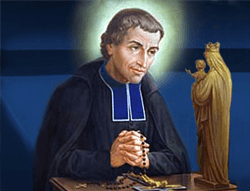(31-01-1673 to 28-04-1716)
Founder of the Montfort Brothers of St. Gabriel
 St. Louis Marie Grignion de Montfort was born on the 31st of January 1673 in a small village in Britanny in western France. The 17th century France was passing through a grave crisis, economic as well as social. Added to this 95% of the population was illiterate. The French Revolution which was to come almost a century later was already brewing.
St. Louis Marie Grignion de Montfort was born on the 31st of January 1673 in a small village in Britanny in western France. The 17th century France was passing through a grave crisis, economic as well as social. Added to this 95% of the population was illiterate. The French Revolution which was to come almost a century later was already brewing.
It was in this atmosphere, charged with tension that St. Louis de Montfort founded the Brothers to impart education to an illiterate France. Not many were willing to follow this stern, austere and maverick saint. When he died on the 28th of April 1716, there were only five Brothers; Montfortian institutions were only a handful and limited to Western France, when the revolution broke out. There was anarchy until Napoleon Came to rescue France and conquered almost the whole of Europe. In 1821, when the Brothers met, they were still only a handful and discouraged. They decided to launch out of France.
The Montfortian saga in India began when on the 11th of September 1903, three French Brothers landed in the French colony of Pondicherry. There was still no Montfortian institution in India. It was in the next year, 1904, that the first Montfortian institution was started at Tindivanam, now in Tamilnadu. This was a technical institution. It is still in existence and flourishing. It was not until the end of the First World War that the first English medium school “Montfort School,” was started on the Shevroy Hills in Yercaud. From 1918 to 2015, Montfortian institutions grew in India from one to nearly a 300 and are now spread over almost all states and Union Territories, literally from Kashmir to Kanyakumari and from Mumbai to Mizoram.
Montfortian institutions are spread over thirty countries, from Canada, Columbia and Peru to Fiji and the Tonga Islands in the Pacific. St. Louis de Montfort was an extremely versatile man. He was a philosopher, writer, poet, musician, artist, sculptor, choreographer, builder and social reformer. The Montfortian philosophy is, therefore, one of totality, globality and universality-terms which are very relevant in today’s world which is in a state of flux. The Montfortian education system, therefore, aims at “total education”-the development of body, mind and spirit so that a Montfortian student can have “fullness” in life and be useful citizen to the country, a faithful and loving person to his family and friends and a fulfilled and contented human being. May we be imbued by the Montfortian spirit and be successful Montfortians.
